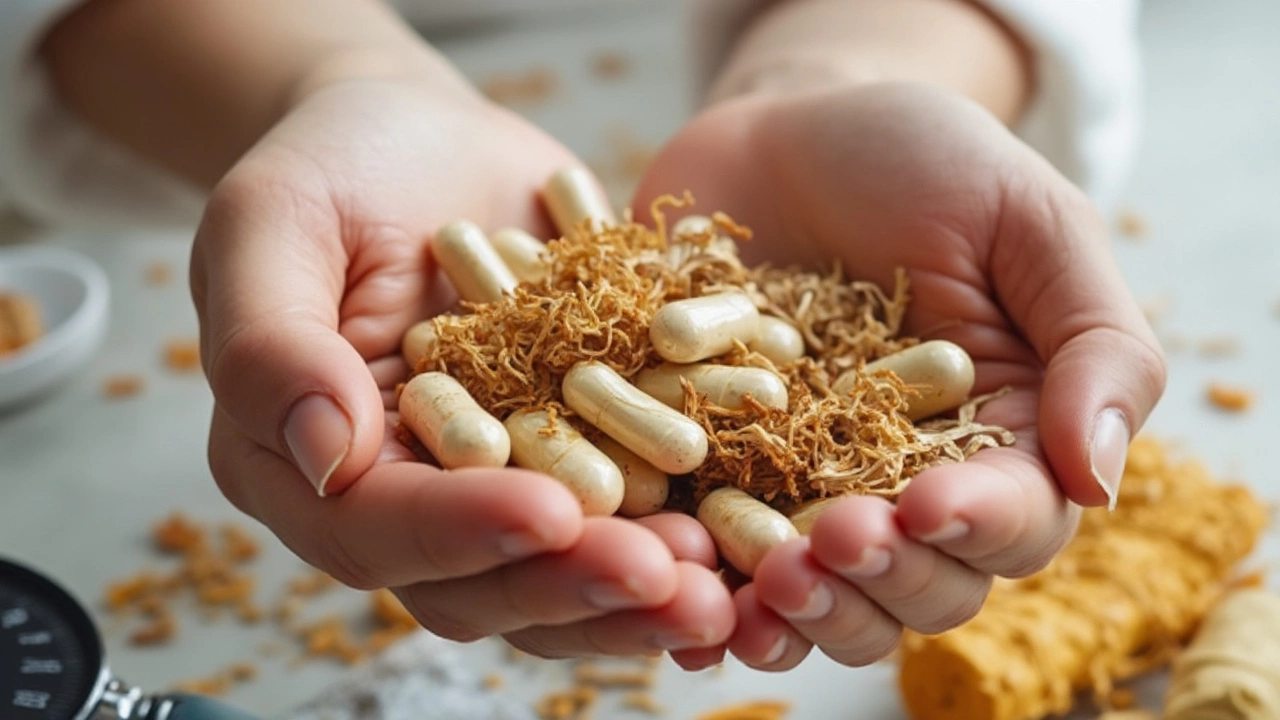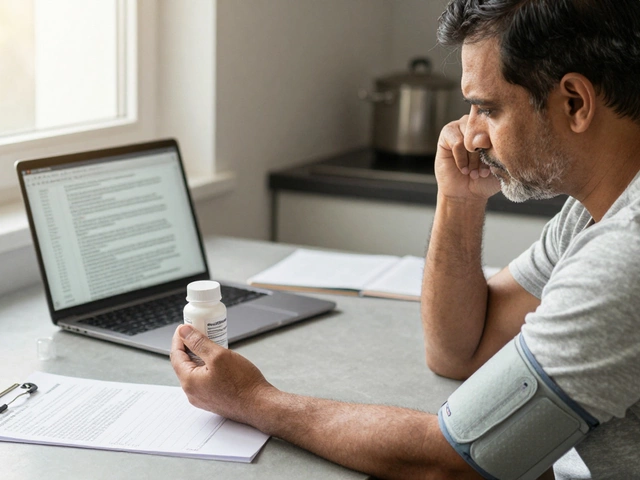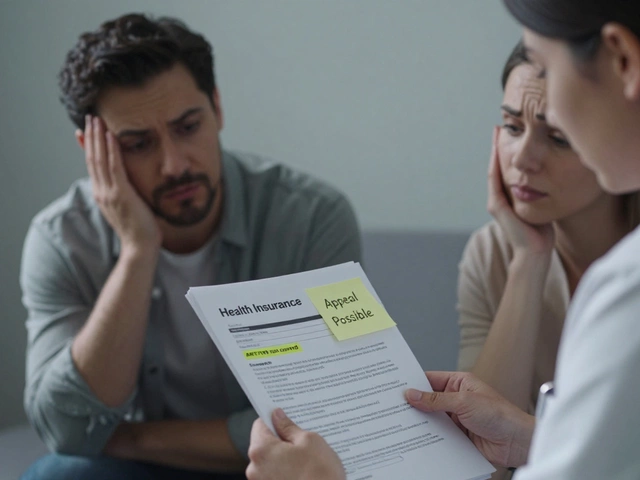Did you know that not all herbs are good for lowering blood pressure? Some of the most common herbal supplements in your kitchen could actually send your numbers the other way. Sounds strange, right? Since most people think of herbs as healing and mild, it's easy to miss the hidden risks—especially if you already manage hypertension or want to avoid it.
So, what’s really going on here? A handful of well-known herbs and roots boost your blood pressure instead of calming it down. Ginseng, licorice root, and even some traditional decongestant herbs can all push your numbers higher. Whether you’re brewing tea, popping a supplement, or adding a pinch to your curry, these natural ingredients can have a much bigger impact than you expect.
If you or someone you know is keeping an eye on their blood pressure, knowing which herbs have this sneaky effect can make a real difference. Let’s get into how these herbs work, when you need to be extra careful, and what to ask if you talk with your doctor or pharmacist about supplements. Knowing what’s in your cup, capsule, or seasoning can help you dodge some unpleasant surprises.
- Why Herbs Affect Blood Pressure
- Herbs That Can Raise Blood Pressure
- Everyday Herbal Ingredients To Watch Out For
- Tips for Safe Herbal Use
- When to Talk to Your Doctor
Why Herbs Affect Blood Pressure
Most folks don’t realize that herbs aren’t just flavor boosters—they pack active compounds that can mess with your body in surprising ways. Some herbs can nudge your blood vessels to tighten up or make your kidneys hang on to more sodium, both of which raise your blood pressure.
Take licorice root, for example. It contains something called glycyrrhizin. Even though it sounds complicated, what it basically does is tell your body to hold onto more salt and water, which drives those blood pressure numbers up. Eating a lot of salty licorice candy or sipping strong herbal teas with licorice can actually make a person with hypertension feel pretty rough after a while.
Ginseng is another classic example. It can boost alertness and energy, but some types (especially Korean ginseng) might stimulate your nervous system. That sends signals to move your blood around faster and causes your heart to work harder. Over time, this can bump up your blood pressure—not great if you’re already on meds or trying to keep things steady.
Certain herbs mess with blood pressure by doing the opposite of what common blood pressure medicines do. While some of these pills are designed to open up arteries or flush out extra water, a handful of herbal supplements contract those same arteries or tell your body to save that salt. So instead of balancing things, the herbs can work against you if you’re not watching closely.
- Some herbs mimic stress hormones and cause your heart to pump faster.
- Others mess with hormone levels, especially the ones that control water and salt.
- A few herbal ingredients can even interact with your current high blood pressure medication and mess up how it works.
This is why it’s pretty risky to assume 'natural' means 'safe.' The active parts of plants can have strong effects, just like regular drugs. If you look at a quick chart, you can see just how various herbs stack up when it comes to bumping your blood pressure:
| Herb | Main Effect | Blood Pressure Impact |
|---|---|---|
| Licorice Root | Salt retention | Raises BP |
| Ginseng | Nervous stimulation | Raises BP |
| Ephedra (Ma Huang) | Vasoconstriction | Raises BP |
So next time you grab an herbal tea or supplement, it’s smart to check what’s inside. Those innocent-sounding ingredients can have a pretty real impact, especially if you already have issues with hypertension or use other herbal supplements.
Herbs That Can Raise Blood Pressure
Most people expect herbs to be gentle or even help lower blood pressure, but it’s not always the case. Some herbs actually do the opposite, so if you care about your blood pressure, take a close look at what you’re using.
Let’s break down the main ones you’ll see in popular supplements, teas, and even snacks:
- Licorice root: This one’s a heavy hitter. It shows up in herbal teas, candies, and energy drinks. Licorice contains glycyrrhizin, a compound that makes your kidneys hold onto sodium and lose potassium. This shift causes fluid buildup, which shoots up your blood pressure. It’s so effective that drinking multiple cups of strong licorice tea daily has sent folks to the emergency room with severe hypertension.
- Ginseng: Ginseng’s meant to boost energy, but it can also give your blood pressure a bump. Some studies found a noticeable jump in systolic blood pressure within just a couple of weeks of daily use, especially with Asian or Panax ginseng supplements. Even doses you find in energy drinks may be enough for a rise.
- Ephedra (Ma Huang): Although banned in many countries, ephedra is still used in some traditional remedies. It acts like a natural stimulant, raising blood pressure, heart rate, and the risk of serious issues like stroke or heart attack. Even “natural” ephedra sources, such as herbal powders or teas, can drive numbers up fast.
- Yohimbe: Sold for male stamina and fat loss, yohimbe bark keeps popping up in online supplements. It’s a strong stimulant and can send your blood pressure spiking—even at small doses. FDA warnings have even named it as risky for anyone with heart problems or hypertension.
- St. John’s Wort: While it’s famous for mood support, St. John’s Wort messes with many blood pressure meds and may cause unpredictable increases in blood pressure if mixed with other supplements or drugs.
Here’s a quick look at how much these herbs can impact blood pressure:
| Herb | Main Effect | Typical Rise in BP |
|---|---|---|
| Licorice Root | Causes water retention, raises sodium | 10-15 mmHg (after daily use for a week) |
| Ginseng | Stimulates nervous system | 5-10 mmHg (with regular intake) |
| Ephedra | Strong stimulant | Up to 20 mmHg (even after a small dose) |
| Yohimbe | Raises heart rate and BP | 5-15 mmHg (with supplement use) |
The rise you might see depends on your health, dose, and how long you use these herbs. Keep an eye on labels and watch out for these ingredients if your blood pressure is already on the high side—or if you’re working to keep it steady. Every bit counts when it comes to hypertension risks.

Everyday Herbal Ingredients To Watch Out For
When you think of herbs that might bump up your blood pressure, you probably picture rare plants or exotic potions. That’s not always the case. You’ll find some of the most powerful blood pressure-raising herbs right in the local grocery store or even in your kitchen spice rack.
- Licorice Root: This one’s a biggie. Licorice root isn’t just for candy lovers. It’s found in teas, herbal cough drops, and many digestion remedies. The compound glycyrrhizin in licorice root can lower potassium and push sodium up, making your body hold onto fluid. That can send blood pressure sky-high, especially with regular use.
- Ginseng: Marketed as an energy booster or immune pick-me-up, ginseng is everywhere from energy drinks to capsules. While some studies suggest mixed effects, Panax ginseng in particular has been linked to increases in blood pressure for certain people—especially if you have hypertension already.
- Ephedra (Ma Huang): While banned in many countries for supplements, ephedra sometimes sneaks into teas from certain Asian markets. Ephedrine, the main active ingredient, acts kind of like caffeine on steroids. It stimulates your heart and can cause some serious spikes in blood pressure.
- Yohimbe: Often promoted as a natural aphrodisiac or exercise enhancer, yohimbe bark increases adrenaline in your body. That’s no good for people concerned about hypertension. Even small doses have caused large jumps in blood pressure in some folks.
- Rosemary: Here’s a shocker—rosemary spice isn’t just for chicken and potatoes. In concentrated oil or supplement form, it can boost blood pressure. Cooked as a food seasoning, it’s usually harmless, but high-dose rosemary teas and oils are a different story.
Here’s a quick look at how these herbal supplements stack up compared to each other when it comes to effects on blood pressure:
| Herb | Main Active Compound | Blood Pressure Effect | Common Uses |
|---|---|---|---|
| Licorice Root | Glycyrrhizin | Raises | Teas, candies, digestive aids |
| Ginseng | Ginsenosides | Can raise (depending on type) | Energy supplements, teas |
| Ephedra | Ephedrine | Strongly raises | Weight loss, energy teas |
| Yohimbe | Yohimbine | Raises | Sexual health, exercise pills |
| Rosemary (high dose) | Rosmarinic acid | Slightly raises | Concentrated oils, teas |
If you spot any of these on an ingredient list and worry about your hypertension, it’s smart to double-check with your doctor. Sometimes the danger comes from using several products at once, not just one mega-dose. And don’t trust the idea that herbal always means mild—these ingredients prove that’s a myth.
Tips for Safe Herbal Use
If you’re curious about using herbal supplements, or you want to avoid a surprise spike in your blood pressure, here’s what you need to know to stay on the safe side.
- Read labels and fine print. Herbs like ginseng or licorice show up in everything from teas to energy drinks. If it sounds “natural,” it doesn’t mean it’s harmless—always check for known blood pressure-boosting ingredients.
- Don’t mix herbs and meds without asking your doctor first. Some herbal supplements can mess with prescription drugs for hypertension. Even simple things like ginger or guarana can throw things off balance.
- Pick trusted brands. Not all herbal products get checked for quality in the same way. Look for supplements tested by third parties, like USP or NSF. A 2023 review showed that about 21% of imported herbal products didn’t match what the label claimed—so don’t just grab the cheapest bottle.
- Keep an eye on your pressure. If you’re trying something new, monitor your numbers with a home device for at least two weeks. A sudden spike could mean a hidden risk in your supplement or diet.
- Start small. If you want to try a new herb, begin with a low dose and increase slowly—if at all. If you notice headaches, flushed skin, or a racing heart, back off right away.
Here’s a quick look at common herbs linked to higher pressure levels:
| Herb | Common Use | Effect on Blood Pressure |
|---|---|---|
| Licorice root | Candy, teas | Can raise blood pressure fast |
| Ginseng | Energy, immunity | Slight increase with regular use |
| Ephedra (Ma Huang) | Weight loss, decongestant | Can cause sharp rise |
If you’re not sure about any herb, ask a health pro who actually knows about natural supplements. According to Mayo Clinic expert Dr. Brent Bauer,
"Just because an herb is sold over the counter doesn’t mean it’s safe for everyone—especially when it comes to blood pressure."
Stay smart with herbs, know what you’re taking, and always keep those natural remedies in check if you care about your numbers. One little habit can make all the difference.

When to Talk to Your Doctor
If you’re thinking about adding new herbal supplements to your routine, or you already have high blood pressure, don’t play guessing games with your health. Chatting with your doctor can save you from finding out the hard way that your chai habit or favorite capsule is messing with your numbers. Honestly, some herbs are real trouble for people with hypertension.
If you notice symptoms like extra pounding in your chest, headaches, or just higher readings than usual after you’ve started using a new herbal remedy, that’s your cue. Even basic stuff like licorice in teas can raise blood pressure, sometimes by over 5-10 mmHg if you have it often. A lot of people think only meds interact, but herbs can throw things off too. The Mayo Clinic says,
“Just because an herb is ‘natural’ doesn’t mean it’s safe for everyone, especially for those who are managing chronic conditions like high blood pressure.”
Here’s when it’s time to book that appointment or at least send a message to your healthcare provider:
- You’re on blood pressure medication and want to start any herbal supplements (even if it’s just a tea blend or capsule from a health store).
- You have a history of hypertension, heart disease, or kidney issues, or it runs in your family.
- You experience new symptoms: headaches, dizziness, fast heartbeat, or anything out of the ordinary after using a new herbal product.
- Your home blood pressure readings start going up without any clear reason.
- You read the supplement label and see anything you don’t recognize—some herbs go by a bunch of different names.
Your doctor may suggest some blood work or even recommend stopping certain “natural” products. If you’re using prescription blood thinners or beta blockers, it’s a must to check for interactions. According to one study in Clinical and Experimental Hypertension, combining certain herbs with blood pressure meds led to a 15% increase in adverse reactions—that’s not a small number.
Tip: Bring your supplement bottles (or a photo) to your appointment, so you’re both on the same page. It makes the whole convo a lot easier and lowers your risk of surprises later.





